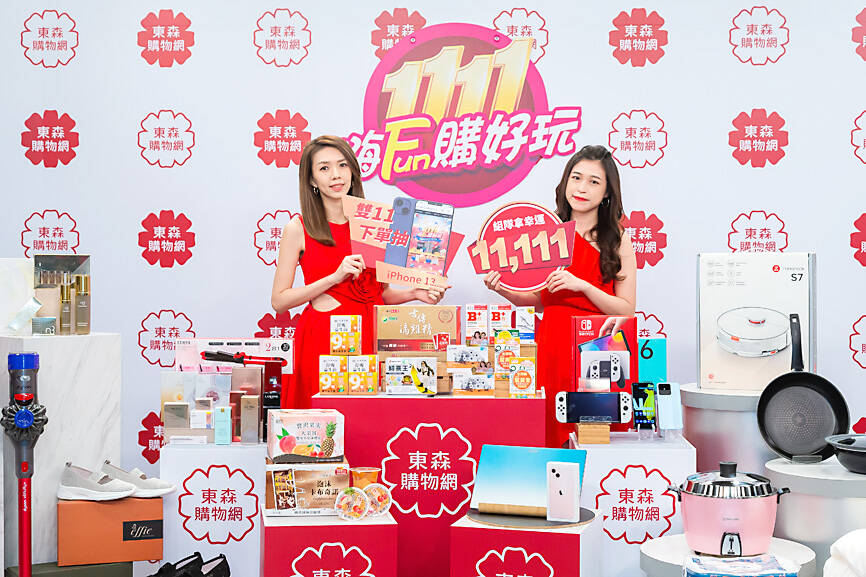Multichannel retailer ETMall (東森購物) has said it would cut its workforce by 200 employees by the end of the year.
In a statement on Monday, ETMall’s owner Eastern Media Group (東森媒體) attributed the move to rising electricity bills, hikes to Taiwan’s minimum wage and interest payments which had caused operating costs to increase by NT$130 million (US$4 million).
Sales on ETMall’s online shopping platform fell by NT$5.9 billion from 2021 to last year — a 58 percent drop — while revenues for its TV shopping division shrank by 20 percent to NT$6.5 billion during the same period, Eastern Media said.

Photo courtesy of Eastern Media Group
Eastern Media said employees who do not take voluntary redundancy would be given help to find new positions within the company.
While ETMall’s offline retail division has posted consistent losses since opening last year, Eastern Media said sales at its shopping mall in Taipei Main Station grew 345 percent in the 12-month period that ended in October.
Eastern Media said it would shutter ETMall’s loss-incurring fresh food online shopping network as well as its Ponta points-based rewards program.
ETMall’s TV shopping channels are also under pressure due to declining cable subscribers, which have fallen from a peak of 5.2 million households to below 4.4 million, Eastern Media said.
Despite some of its holdings incurring losses, Eastern Media said that the group remained profitable, adding that ETMall’s best-performing employees would be given a 5 percent pay raise after the upcoming Lunar New Year holiday.
Lu Chih-ming (盧志銘), a specialist from the New Taipei City Labor Affairs Department, yesterday said that ETMall has notified his department of its workforce reduction plans.
Lu said that to his knowledge, many of the workers affected by ETMall’s downsizing plan had accepted voluntary severance packages.

SEEKING CLARITY: Washington should not adopt measures that create uncertainties for ‘existing semiconductor investments,’ TSMC said referring to its US$165 billion in the US Taiwan Semiconductor Manufacturing Co (TSMC, 台積電) told the US that any future tariffs on Taiwanese semiconductors could reduce demand for chips and derail its pledge to increase its investment in Arizona. “New import restrictions could jeopardize current US leadership in the competitive technology industry and create uncertainties for many committed semiconductor capital projects in the US, including TSMC Arizona’s significant investment plan in Phoenix,” the chipmaker wrote in a letter to the US Department of Commerce. TSMC issued the warning in response to a solicitation for comments by the department on a possible tariff on semiconductor imports by US President Donald Trump’s

The government has launched a three-pronged strategy to attract local and international talent, aiming to position Taiwan as a new global hub following Nvidia Corp’s announcement that it has chosen Taipei as the site of its Taiwan headquarters. Nvidia cofounder and CEO Jensen Huang (黃仁勳) on Monday last week announced during his keynote speech at the Computex trade show in Taipei that the Nvidia Constellation, the company’s planned Taiwan headquarters, would be located in the Beitou-Shilin Technology Park (北投士林科技園區) in Taipei. Huang’s decision to establish a base in Taiwan is “primarily due to Taiwan’s talent pool and its strength in the semiconductor

Industrial production expanded 22.31 percent annually last month to 107.51, as increases in demand for high-performance computing (HPC) and artificial intelligence (AI) applications drove demand for locally-made chips and components. The manufacturing production index climbed 23.68 percent year-on-year to 108.37, marking the 14th consecutive month of increase, the Ministry of Economic Affairs said. In the first four months of this year, industrial and manufacturing production indices expanded 14.31 percent and 15.22 percent year-on-year, ministry data showed. The growth momentum is to extend into this month, with the manufacturing production index expected to rise between 11 percent and 15.1 percent annually, Department of Statistics

An earnings report from semiconductor giant and artificial intelligence (AI) bellwether Nvidia Corp takes center stage for Wall Street this week, as stocks hit a speed bump of worries over US federal deficits driving up Treasury yields. US equities pulled back last week after a torrid rally, as investors turned their attention to tax and spending legislation poised to swell the US government’s US$36 trillion in debt. Long-dated US Treasury yields rose amid the fiscal worries, with the 30-year yield topping 5 percent and hitting its highest level since late 2023. Stocks were dealt another blow on Friday when US President Donald